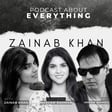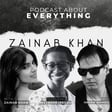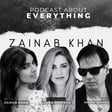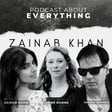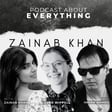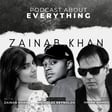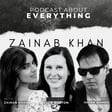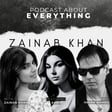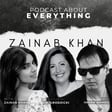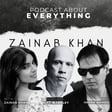
Book Week Series: The Art of Literature and Illustrations ft. David Barrow | Ep. 9
Welcome to our ninth podcast episode, where we have the privilege of diving into the world of literature and illustrations with David Barrow. This special episode is a part of the Book Week Series.
Join us as we embark on David Barrow's journey, from his humble beginnings as a children's book illustrator in the heart of England to his influential role in shaping the world of picture books. In this episode, we'll delve into David's passion for storytelling and illustration, his dedication to nurturing young talents through teaching at the Cambridge School of Art, and his remarkable achievements, including winning the Sebastian Walker Award for most promising new illustrator.
Whether you're an aspiring illustrator, a children's book enthusiast, or simply curious about the creative process behind picture books, this episode promises to offer valuable insights and inspiration from David Barrow's fascinating career. So, join us as we celebrate the magic of storytelling with David Barrow, whose captivating illustrations continue to captivate readers of all ages.
About David Barrow:
David Barrow is a children's book illustrator based in the heart of England. He earned his MA in Children's Book Illustration from the Cambridge School of Art in 2015, winning the Sebastian Walker Award for most promising new illustrator. His debut book, "Have You Seen Elephant?," garnered international acclaim, followed by numerous publications, including collaborations with authors like Joseph Coelho. David now teaches at the Cambridge School of Art, leads the Picture Book Illustration Meet-up for the UK Association of Illustrators, and serves as ambassador for the Northamptonshire contingent of the Federation of Children’s Book Groups. He lives with his wife, son, and an annoying cat. David's website: https://www.amazon.com/stores/author/B0744KH4WN
About Book Week Series:
Book Week Series is a celebration of authors and illustrators from around the world. For the past two years, this series has been a favorite on Studimation, where we've explored the art of storytelling through insightful interviews. This year, we're excited to move the series to The Zainab Khan Podcast, now available on Spotify, Apple Podcast, Google Podcast, iHeart Radio, and more. Join us as we highlight diverse voices in literature, sharing their journeys, inspirations, and advice. Whether you're a literature enthusiast or an aspiring writer, our Book Week Series offers enriching and inspiring conversations. Tune in to The Zainab Khan Podcast and celebrate storytelling with us!
To see the video version of this episode subscribe to the YouTube channel: https://www.youtube.com/@thezainabkhan
Website: https://thezainabkhan.com/
Instagram page: https://www.instagram.com/zainabkhanpodcast/
